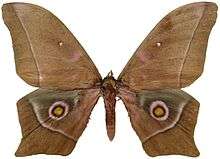Imbrasia obscura
Imbrasia obscura is a species of moth belonging to the family Saturniidae first described by Arthur Gardiner Butler in 1878.
| Imbrasia obscura | |
|---|---|
 | |
| Male – dorsal view | |
| Female – dorsal view | |
| Scientific classification | |
| Kingdom: | |
| Phylum: | |
| Class: | |
| Order: | |
| Family: | |
| Genus: | |
| Species: | I. obscura |
| Binomial name | |
| Imbrasia obscura (Butler, 1878) | |
| Synonyms | |
| |
Description
Imbrasia obscura has a wingspan reaching about 10–11 centimetres (3.9–4.3 in). The basic colour of the wings is brown, with two large, black, red and white eyespots on each hindwing. Larvae are whitish, with black markings, while the head and the spiny appendages are red, with white hairs.
Distribution
This species can be found in the tropical Africa, mainly in Angola, Guinea, Cameroon and Nigeria).[1]
gollark: Consider my advice or you will not have considered my advice.
gollark: Just reading books repeatedly is probably not great.
gollark: Spaced repetition stuff like Anki for factual facts. Do practice questions for stuff you're bad at for procedures and whatever.
gollark: My basement.
gollark: So the probability of there being one or more birthday today is 0.142, assuming birthdays are uniformly distributed and ignoring leap years.
References
- Rougerie, R. & Collective of iBOL Saturniidae expert taxonomists (2009). "Imbrasia obscura". Lepidoptera Barcode of Life. Retrieved July 26, 2017.
- "Imbrasia obscura". Encyclopedia of Life.
External links
- "Imbrasia obscura (Butler, 1878)". African Moths. Retrieved November 12, 2018.
- ZipcodeZoo
- Papillons di Gabon
- Caterpillars
This article is issued from Wikipedia. The text is licensed under Creative Commons - Attribution - Sharealike. Additional terms may apply for the media files.